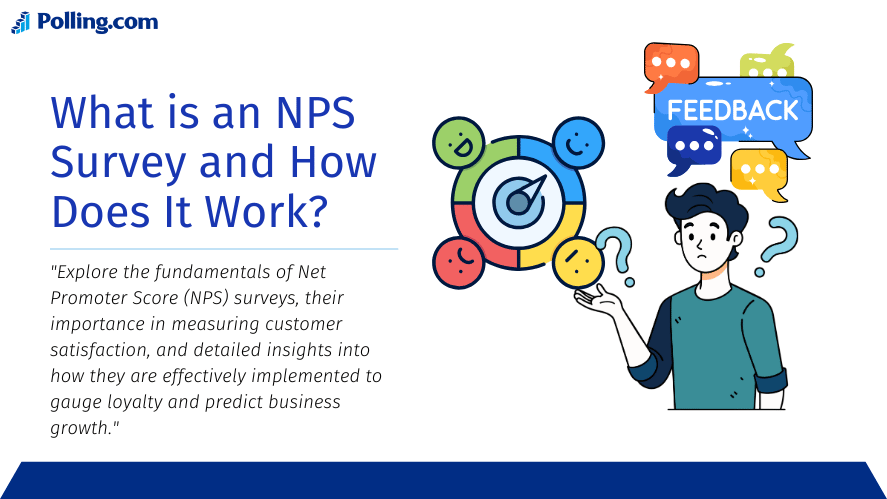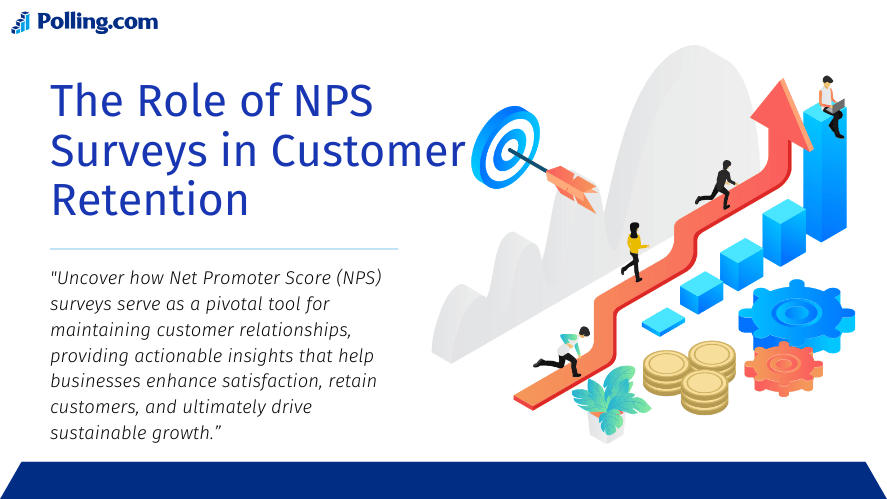
NPS Survey: Unlock Customer Loyalty and Drive Growth
In today’s business world, understanding customer satisfaction is essential. Companies that focus on keeping customers happy and loyal tend to grow faster. One of the best tools for measuring customer loyalty is the Net Promoter Score (NPS) survey. NPS surveys reveal how customers feel about your brand. This feedback can help your business grow, improve customer loyalty, and spread positive word-of-mouth.
This article explains what NPS surveys are, how they work, and how you can use them to grow your business. By the end, you’ll see why NPS surveys are essential for keeping customers happy and loyal.
What is an NPS Survey and How Does It Work?

The Net Promoter Score (NPS) is a simple way to measure customer loyalty. Created by Fred Reichheld in 2003, the NPS survey asks one main question: “On a scale of 0 to 10, how likely are you to recommend our business to a friend or colleague?” This question is simple and quick for customers to respond to.
The NPS Categories
When customers answer the NPS question, they fall into one of three groups which we determine as NPS categories:
- Promoters (9-10): These are very happy customers who are likely to recommend your business to others.
- Passives (7-8): These customers are generally satisfied but not excited. They might switch to a competitor if they find a better offer.
- Detractors (0-6): These are unhappy customers who may speak negatively about your brand.
To find your NPS score, subtract the percentage of Detractors from the percentage of Promoters. Your score can range from – 100 to 100, with higher scores meaning stronger customer loyalty.
Why NPS Surveys Matter for Business Success
NPS is a quick and easy way to see how loyal your customers are. Loyal customers are more inclined to make repeat purchases and suggest your business to others. By tracking NPS, you can understand what customers like, find areas to improve, and boost customer satisfaction over time.
How NPS Surveys Drive Business Growth
NPS surveys are more than a way to measure customer loyalty they can help your business grow. Here’s how:
Identifying Growth Opportunities Through NPS Surveys
NPS surveys help you identify Promoters, or your most loyal customers. These customers are likely to recommend your business to others, which can lead to growth. Explore the best NPS tools here.
- Organic Growth through Referrals: When happy customers recommend your brand, it brings in new customers for free. This type of growth is powerful because it doesn’t require extra spending on marketing.
- Better Customer Acquisition: By understanding what Promoters love about your brand, you can use this information in your marketing. Highlighting these strengths can help you attract similar customers.
Improving Products and Services Based on NPS Feedback
NPS surveys help you find areas where your product or service could improve. This is especially true when you look at feedback from Passives and Detractors.
- Product Improvements: Passives and Detractors often point out specific issues or areas where they aren’t fully satisfied. Use this feedback to make changes that better meet customer needs.
- Data-Driven Decisions: By reviewing NPS data regularly, you can make decisions based on real customer feedback. This helps you create products and services that customers actually want.
Creating a Customer-Centric Culture with NPS Surveys
NPS isn’t just a score; it’s a way of thinking. It helps create a customer-centric culture where everyone in the company focuses on improving customer experience.
- Building Customer-Centricity: When NPS feedback is shared across departments, everyone can work together to improve customer satisfaction. This creates a more dedicated and loyal customer base.
- Long-Term Loyalty: A customer-centric culture helps build long-term relationships with customers. Satisfied customers tend to remain loyal, which supports your business’s long-term growth.
The Role of NPS Surveys in Customer Retention

Keeping your customers is key to growing your business. NPS surveys can help you understand why some customers stay loyal and why others may leave.
How to Leverage NPS Categories for Customer Loyalty
Turning Detractors into Loyal Customers with NPS Insights
Detractors represent a big opportunity for improvement. If you address their concerns, you may be able to turn them into loyal customers.
- Closing the Feedback Loop: After hearing from a Detractor, follow up to address their concerns. By showing that you care and are working to fix issues, you can often change their opinion.
- Responsive Service: Customers want to feel valued. Quick and helpful responses make a big difference and can prevent customers from leaving.
Engaging Passives with Personalized Offers
Passives are customers who are mostly satisfied but not excited about your brand. With some effort, you can turn them into Promoters.
- Personalized Offers: Offer Passives targeted deals or discounts to make them feel valued. Even small gestures can significantly strengthen customer loyalty.
- Opportunities for Improvement: Pay attention to feedback from Passives to understand what’s holding them back. Small improvements can make a big difference in moving them towards becoming Promoters.
Leveraging Promoters for Positive Word-of-Mouth
Promoters are already happy with your brand, but there are ways to engage them even more.
- Exclusive Offers and Loyalty Programs: Offer Promoters special deals or loyalty rewards to keep them engaged. This makes them feel appreciated and strengthens their bond with your brand.
- Using Promoter Feedback in Marketing: Positive feedback from Promoters can be used in marketing. Testimonials, reviews, and case studies can attract new customers and show potential customers why others love your brand.
Best Practices for Implementing NPS Surveys
To get the most out of NPS surveys, it’s important to follow best practices. Here’s how to do it right:
Choosing the Right Timing and Frequency for NPS Surveys
Timing your NPS surveys properly is crucial.
- After Key Interactions: Send surveys after important events, like a purchase or a customer service call, when feedback is fresh.
- Avoiding Survey Fatigue: Don’t over-survey. Too many requests can annoy customers and lead to lower response rates.
Personalizing Your NPS Survey and Follow-Ups
Make NPS surveys feel personal to increase response rates and customer engagement.
- Personalized Survey Content: Address customers by name, and customize the survey language to make it feel more personal.
- Follow-Up Messages: Thank respondents, especially those who provided detailed feedback. For Detractors, offer further help; for Promoters, express your appreciation.
Acting on Feedback from NPS Surveys
Collecting feedback is only part of the process. Acting on it is what makes a difference.
- Using Feedback for Improvement: Use feedback to make changes across your business, whether it’s improving product features or updating customer service practices.
- Communicate Changes: Let customers know their feedback led to improvements. This shows that you listen and care about their opinions.
Case Studies: Real-World Examples of NPS Success
Here are some examples of companies that have used NPS successfully to grow their business:
- Apple: Apple uses NPS to gather feedback in its stores and online. By listening to customers and improving products, Apple maintains a strong base of loyal fans.
- Zappos: Known for customer service, Zappos uses NPS to track satisfaction and follow up on feedback. This helps them build a loyal customer base that promotes their brand.
- Slack: Slack uses NPS to improve its platform by listening to user feedback. By addressing common issues, Slack has boosted user satisfaction and retention.
Conclusion
Net Promoter Score (NPS) surveys are a simple but powerful tool for building customer loyalty and driving business growth. By identifying Promoters, Passives, and Detractors, you can get a clear picture of customer satisfaction and loyalty.
Using NPS feedback can help you improve products, focus on customer needs, and foster a customer-first culture. This leads to better retention, stronger customer relationships, and more referrals. In the long run, a good NPS program can make a huge difference in the success of your business.
For any business that wants to thrive, investing in an NPS program is a smart move.
